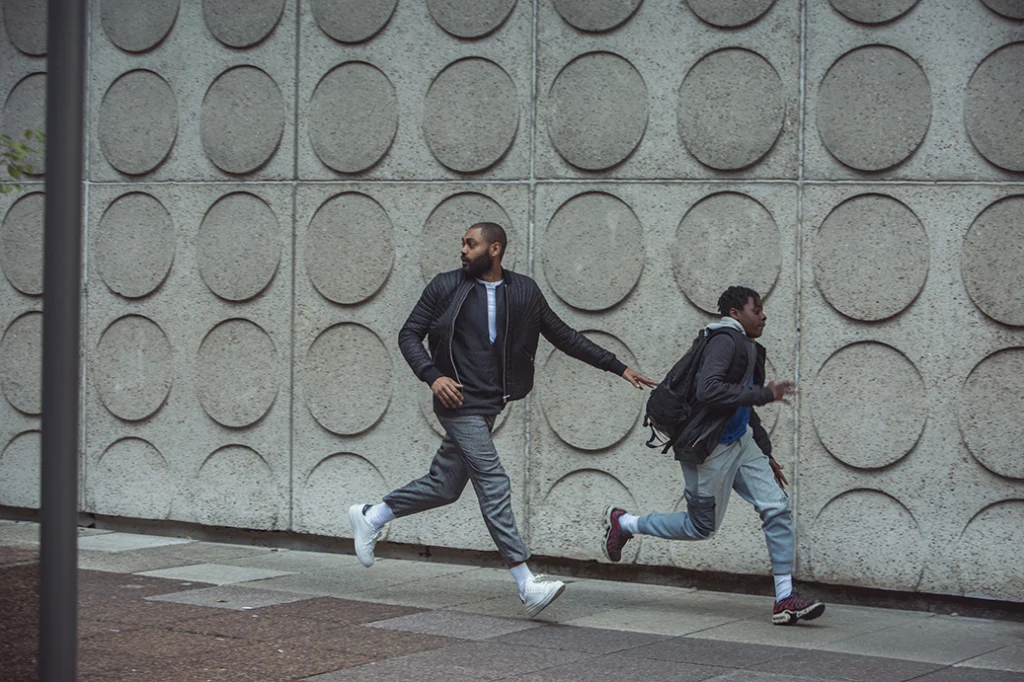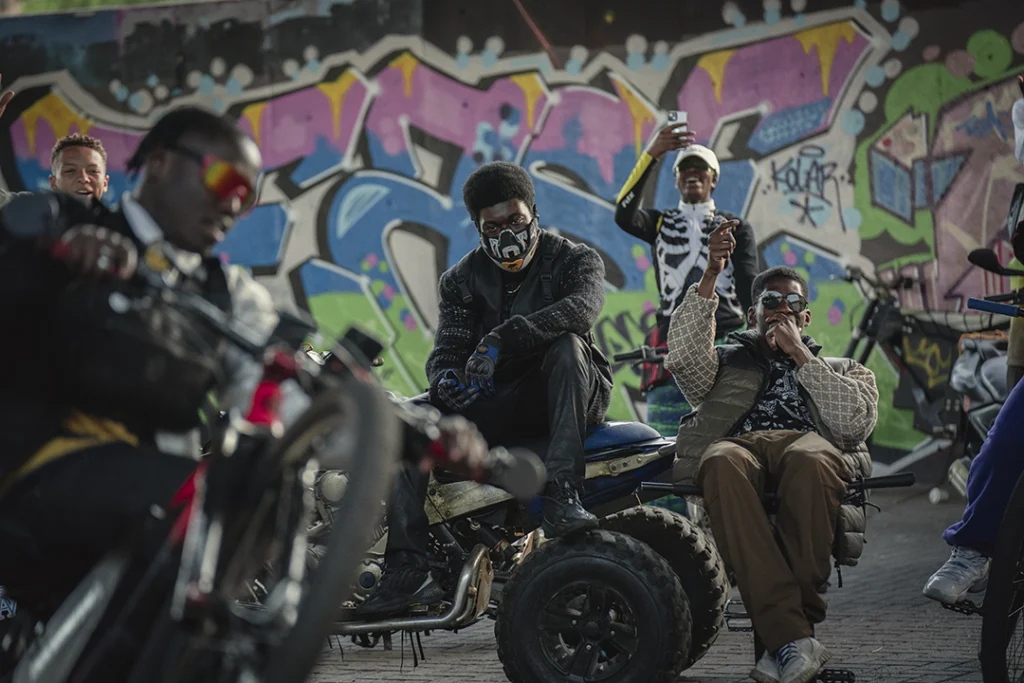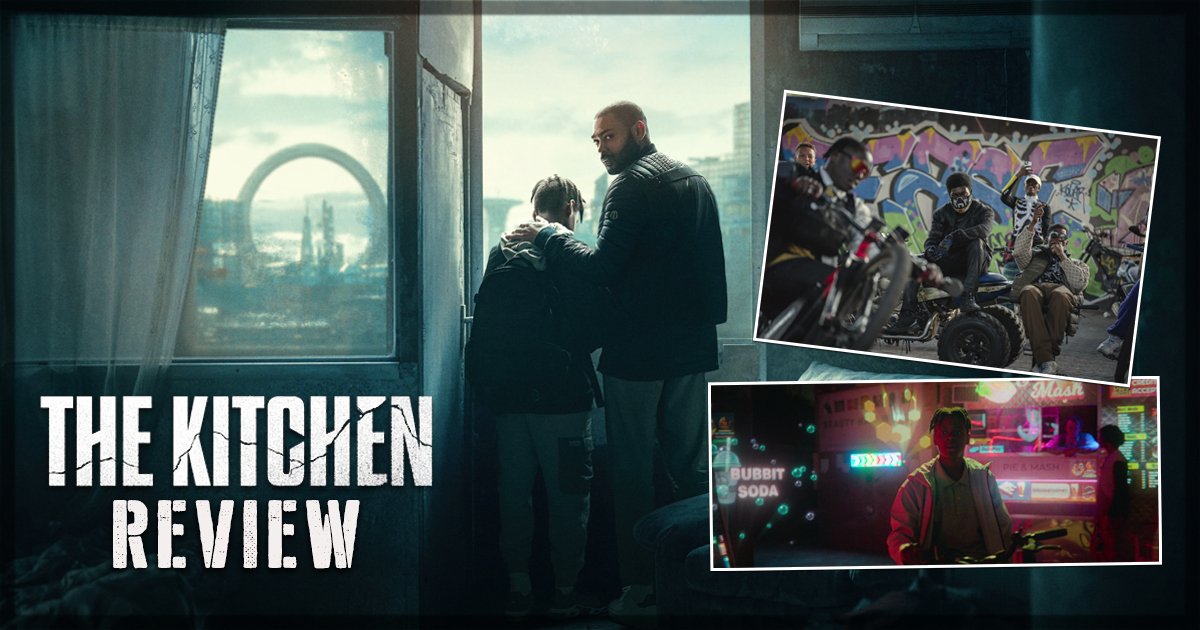The Kitchen, now out on Netflix, is an impressive first effort at feature directing for Academy Award-winning Actor Daniel Kaluuya. Alongside British filmmaker Kibwe Tavares, this creative pair, who direct together in their feature debut, have brought a new socio-political gritty drama in a fantastical world set in the not-so-distant future. There are powerful themes at The Kitchen’s core that challenge wealth inequality and the state of the world.
The big question this film raises: What would happen if you removed social housing from society? The Kitchen takes a hard look at the class system and how so many people in society will be left behind. It’s a fictional world with elements of truth as it takes place in a dystopian London in 2044. The people who were in social housing refuse to leave their community, known as “The Kitchen,” and are left to live on the street. They are treated in inhumane ways: supplies stop being delivered, and the police come in for weekly raids. People are at risk of being killed or taken. Taken where? We’re not sure.

The Kitchen is bound together by community
Despite all of the turmoil, the residents of The Kitchen have a deep sense of community. There’s an emphasis on togetherness and heart, with one memorable scene in the bar. Watching the scenes of the community and how they all come together and look out for one another reminds me of how important it is to take care of your neighbor.
The main character in the film is Izi, played by actor Kane Robinson, who is best known for being Sully in the TV series Top Boy. Izi has been trying to get out of The Kitchen his whole life. He lovingly refers to it as a dump and sees it at face value. Jase (Demmy Ladipo), someone he worked with, saw the heart and community in the kitchen. He saw it as a home for himself, his daughter, and many people he cared about.
I could actually feel the love that everyone had for one another in The Kitchen. When one of the residents turned 86, they all celebrated this moment alongside him. Even though the place was not glamorous, everyone knew each other, and that’s what made it so special.
Izi’s characterization was difficult to connect with at times
Even though Izi can sometimes be likable, I found it hard to connect with him. I don’t get characters like this – people who hate where they came from or their ethnicity, and it’s not until they see what’s on the other side that they finally appreciate what they have. They see what makes them different from everyone else as the blessing it always was. Benji (Jedaiah Bannerman) has a close connection to Izi, and it brings in a charming focus on the importance of fatherhood in these communities as well.
This story follows a community that refuses to abandon their home, made up of an ultra-talented cast. The film’s stars, Kane Robinson, Jedaiah Bannerman, and Hope Ikpoku Jnr, shine in The Kitchen. Between Robinson’s performance in The Kitchen and Top Boy, there is a strong case for the actor to be Britain’s new leading man. Another gem in this film is seeing new talent getting the chance to help bring this story to light on a massive platform like Netflix. I love seeing a community fighting to preserve their home in the face of gentrification and social upheaval. This film dives into the many challenges faced by the residents of The Kitchen but still plays a hopeful note with an essential exploration of the importance of unity.

The Kitchen hits close to home with a dystopian portrayal of inequality
The Kitchen’s pacing can be slow at times, especially in the film’s second half. There’s an argument to be made that this film isn’t so much science fiction as it is real-life fact. The movie presents a dystopian future, but I think we are seeing this happen in real time. In Dallas, there is an organization called Food Not Bombs that has this mission to feed the homeless; however, during their weekly services, they have received 90 tickets from the police. Cops in New York periodically tear down tent encampments that house homeless people.
Throughout the US, there is a rise in anti-homeless sentiment, which is entirely unfair. Rent has been rising, and the average salary for working Americans hasn’t increased. Many people are even more at risk of being on the streets than five years ago. The Kitchen came out at the right time, and the message resonated strongly with me, relating to what ordinary people are dealing with now.
To sum it up, The Kitchen is very different from a typical sci-fi crime thriller. Written by Kaluuya and Joe Murtagh, it is a powerful story about family, community, and resilience. As we watch Izi’s journey to reunite with his son Benji, we are also entangled in the struggles of a community determined to preserve their home against societal challenges. It’s refreshing to watch a movie that’s culturally on time with the economic struggles of the everyman while maintaining the grit you see in shows like Top Boy.
The Kitchen serves as a reminder of the impact we can have on our neighbors as we find strength in unity and the beauty, love, and warmth that comes from a tight-knit community. Although this story didn’t have to be told in a dystopian landscape, directors Daniel Kaluuya and Kibwe Tavares masterfully balance the clear influence of Black Mirror and an honest look at real-life struggles to bring us a film that leaves an impression.
The Kitchen is now streaming on Netflix.
Have you watched the movie yet? What did you think? Connect with us on X @MoviesWeTexted to share your thoughts.


